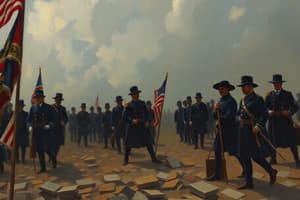Podcast
Questions and Answers
What was a primary reason for the formation of the Triple Entente?
What was a primary reason for the formation of the Triple Entente?
- To prevent a potential German attack (correct)
- To establish military dominance over the Balkans
- To gain control of colonial territories in Africa
- To form a unified front against Italy
Which countries were initially part of the Triple Alliance?
Which countries were initially part of the Triple Alliance?
- Austria-Hungary, Russia, and Italy
- France, Britain, and Russia
- Germany, France, and Belgium
- Germany, Austria-Hungary, and Italy (correct)
How did the alliance system contribute to the outbreak of World War I?
How did the alliance system contribute to the outbreak of World War I?
- It created obligations for countries to support one another in conflicts (correct)
- It eliminated the need for military alliances altogether
- It reduced tensions by fostering cooperation among nations
- It allowed for peaceful negotiations between rival nations
What role did imperialism play in the lead-up to World War I?
What role did imperialism play in the lead-up to World War I?
What was a consequence of Austria-Hungary's desire to control the Balkan region?
What was a consequence of Austria-Hungary's desire to control the Balkan region?
What is nationalism primarily characterized by?
What is nationalism primarily characterized by?
How did imperialism influence nationalism among European powers?
How did imperialism influence nationalism among European powers?
What was one significant effect of nationalist movements in the Balkans prior to World War I?
What was one significant effect of nationalist movements in the Balkans prior to World War I?
Which event was sparked by Serbian nationalism and triggered World War I?
Which event was sparked by Serbian nationalism and triggered World War I?
What role did competition among Great Powers play in the buildup to World War I?
What role did competition among Great Powers play in the buildup to World War I?
How did the desire for dominance affect the First World War?
How did the desire for dominance affect the First World War?
What was a common misconception about nationalism during the lead-up to World War I?
What was a common misconception about nationalism during the lead-up to World War I?
Which statement best describes the relationship between nationalism and imperialism?
Which statement best describes the relationship between nationalism and imperialism?
Flashcards are hidden until you start studying
Study Notes
The Alliance System
- European powers formed alliances to protect themselves.
- Triple Entente: France and Russia formed an agreement in 1894. Britain joined in 1904 and 1907, leading to a three-way alliance. This alliance aimed to resolve colonial disputes in Asia and the Middle East and to counter potential German aggression.
- Triple Alliance: Germany, fearful of encirclement by France and Russia, allied with Austria-Hungary in 1879. Austria-Hungary sought control over the Balkan region, sparking tensions with Russia, and Italy joined in 1882 due to fears of French attack.
Impact of Alliances on WWI
- The alliance system amplified conflicts: minor disputes escalated into a world war because alliances obligated members to intervene.
- Two major alliances (Triple Alliance and Triple Entente) were formed. When one member declared war, the entire alliance was compelled to participate, significantly increasing the likelihood and scope of the war.
- Alliances fostered animosity between nations, making war more likely. These agreements connected nations through treaties, causing conflicts to spread rapidly.
Imperialism
- Competition fueled the war: countries sought to expand their empires and economies through industrialization.
- Britain and Germany engaged in intense rivalry over overseas empires. This competition for resources and territories further fueled tensions leading to war.
Nationalism
- Nationalism is a devotion to one's own nation.
- Countries prioritize their own interests and culture above all others.
- Imperialism can intensify nationalism, as a country's dominance can anger those it seeks to dominate.
- The pursuit of national interests fuels conflicts worldwide.
Nationalism and World War I
- Nationalism contributed to the outbreak of World War I.
- European powers competed fiercely for dominance, leading to distrust and animosity.
- The Moroccan Crises of 1905 and 1911 exemplify disputes driven by the desire for superiority.
- Imperialism intensified nationalistic rivalries, leading to conflict between nations.
- Slavic nationalism in the Balkans challenged the Austro-Hungarian Empire, pushing for independence.
- The assassination of Archduke Franz Ferdinand, fueled by Serbian nationalism, sparked the war.
- Each country's desire for dominance prolonged the conflict.
- Aggressive nationalism created an unstable environment, leading to the inevitable war.
Studying That Suits You
Use AI to generate personalized quizzes and flashcards to suit your learning preferences.




